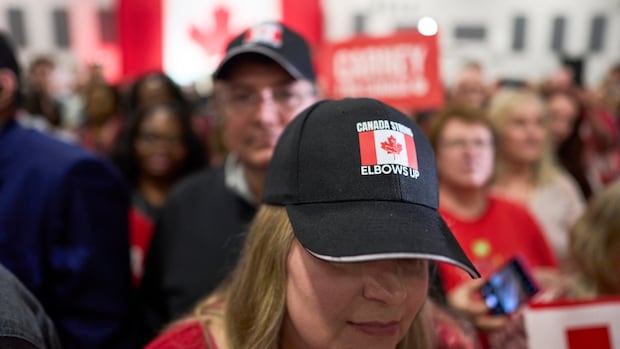When Rachael Coe decided to launch an “elbows up” merchandise line at her store in Yarmouth, N.S., in March, she said it was an immediate bestseller.
Within a week, Coe said her Timeless Memories shop had already made 400 sales. By the end of the first month, she had sold 2,500 products ranging from T-shirts to hoodies to car decals.
Demand for items bearing Canada’s rallying cry against U.S. President Donald Trump’s tariffs and annexation threats was so high that Coe launched a website to keep up with the surge.
“It was a response from all over Canada,” she said. “We reached every single province, then we started covering worldwide. Our ‘elbows up’ merch went everywhere.”
Many Canadian businesses hopped on the patriotic trend that also saw Ontario Premier Doug Ford wearing a “Canada Is Not For Sale” ball cap ahead of a January meeting with Canada’s premiers and prime minister.
In response to U.S. President Donald Trump’s tariffs, Canadian actor Mike Myers may have started a movement by pointing to his elbow and mouthing the words ‘elbows up’ during appearances on Saturday Night Live. The phrase has caught on and has become a rallying cry in the trade war.
But Coe’s sales started slowing down by May. And despite a slight boost ahead of Canada Day, she said the “elbows up” line is now selling at similar rates to the classic red-and-white merchandise she sells every year around this time.
Although business owners say they are selling more Canada-themed products this year leading up to July 1, many have also noted a decline in “elbows up” merchandise sales.
The hockey phrase — which originated with the legendary player Gordie Howe — became a national rallying cry in March after Canadian comedian Mike Myers mouthed the words on Saturday Night Live while wearing a “Canada Is Not For Sale” T-shirt.
initially embraced as a grassroots movement at the height of cross-border trade tensions and Trump’s musings about making Canada the 51st state, it has shifted to a more generic expression of Canadian pride amid continued tensions, retailers and experts say.
Others note that the phrase “elbows up” has increasingly been used in a partisan context, contributing to the marketing shift.
Stephanie Tomlin, Toronto-based owner of the online business Shop Love Collective, said she saw an explosion in “elbows up” merchandise sales in March, selling as many as 10 or 15 products per day. Similarly, her sales began to stagnate in May.
Many Canadians are re-thinking their relationship with the United States as U.S. President Donald Trump levies tariffs and threatens to make Canada the 51st state. Windsorite Mary Gilbeault is making hundreds of ‘Elbows Up’ pins to share her national pride. She speaks with CBC…
Read More: Demand for ‘elbows up’ merchandise dips ahead of Canada Day, businesses say





